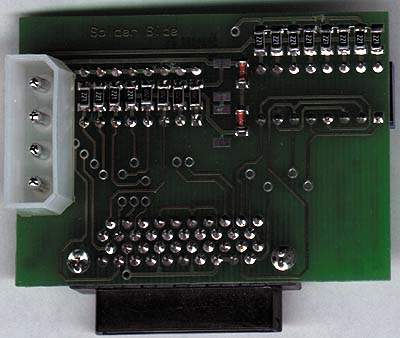Like the K7 Overclock Card, the FreeSpeed Pro mounts vertically on the Athlon’s feature connector. The card is quite small, measuring in at 55mm wide x 40mm high (2.2” x 1.6”) and features two dip switch blocks.
The first block features 8 switches which control the clock multiplier. The next four dip switches on the second block control the voltage and the final four switches control the multiplier along with the first 8 switches.
The switches on both blocks are like those on the first block on the K7 Overclock Card: although they are fairly easy to adjust, those with larger fingers may have some problems changing the switch positions without hitting more than one switch.


Once again, since there are a total of 16 switches on this card, the likelihood that of missing a switch setting is greater than if we had fewer possible settings (as is the case with the Afterburner). You will want to double check the settings on the FreeSpeed Pro before proceeding to power up your system.
Speaking of power, the best feature of the FreeSpeed Pro is that the 4-pin power connector is mounted directly to the card’s PCB, which is a huge improvement over the loosely connected power cables on the K7 Overclock Card. Since the power connector sticks out from the back of the card, you may have some problems if you have an exhaust fan at the back of your case, but, with a bit of care, you shouldn’t have too much trouble.
The one complaint that we had about this connector was the fact that Ninja Micros failed to include a Y-splitter for the power, meaning that you have to use up a power connector in order to power the board. At the same time, because the board will be installed on your CPU, which is a decent distance from your drive bays, you’ll need a Y-splitter cable with long extensions if you plan on making use of any of the split 4-pin power connectors.
Like all of the other cards, the FreeSpeed Pro shouldn’t have any problems being installed on a MC1000 equipped Athlon CPU.
According to Ninja Micros, they have not been having any problems with supplying the cards and, in their news posts, they provide up to date statistics on how many cards they have in stock as well as how many they are due to receive. They do have a contingency plan ready if they ever receive an order for a card and they happen to be out of stock of the cards. According to their news posts, they will not cash any check orders until the cards are ready and they will email the buyer with a lead time and ask them if they would like to cancel.
Currently they only accept payment by Check or Money Order (or cash if you feel like sending it in the mail) but they also have a very comprehensive list of international distributors, most of which accept credit cards. If you’re looking to get one of these puppies, you’ll probably be able to grab one from a number of places, including distributors in the US, Finland, Australia, Norway, Italy and a number of other countries.
The cost of a single card weighs in at a definitely hefty $65. While this is still cheaper than the Afterburner, it is a tad higher than what we would recommend paying if you can get the cheaper K7 Overclock Card, which is a slightly better option. One thing to keep in mind is that the $65 charge does include shipping and handling to anywhere in the world, which makes the amount a bit easier to accept.
However, if you are in a country where you can’t order something like the K7OC (for whatever reason) then the wide reach of Ninja Micros’ distributors will probably work to your benefit and you’ll probably just ignore the cost because, after all, a $65 card is better than nothing if you want to overclock your Athlon.










0 Comments
View All Comments